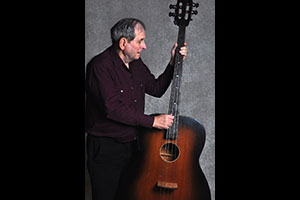We’re all in the same boat
By Jon Liebman
September 9, 2022
Do you think older people have different issues with learning bass than younger people?
I was talking to Jeff Berlin recently, for a conversation published as this week’s (must-see!) FBPO interview. If you know anything about Jeff, you know he’s got some very strong opinions about bass education, and he has no problem sharing them.
Though he’s softened his approach lately, he still gets pretty passionate whenever the subject comes up.
There’s no “slowing down” element
When I asked him about his thoughts on learning bass, particularly for those who start later in life, Jeff was quick to point out that the issues facing older students are similar to the younger ones in more ways than people think.
“There’s no slowing down element,” Jeff says. “There’s no, ‘You’re old, you’ll have more trouble.’ You’ll have the same difficulty that a 20-year-old will have.”
I just listened and let him elaborate.
“Everybody wants to sound good,” he continued. “And here’s some hard news: You won’t. I won’t. We have to deal with the step-by-step and allow ourselves to sound bad so that we have a platform to go up from. And that’s the way we learn.”
Practicing vs. performing
Of course, there’s a positive side to what Jeff’s saying. Learning bass, after all, is a means to an end. The problem, according to Jeff, lies in making the distinction between practice and performance. In other words, he says, there’s too much emphasis on playing artfully and not enough on diving in and getting it right in the first place.
“You absolutely can improve,” Jeff says. “There’s no doubt about it. A lot of bass players hate the idea (of practicing) where it isn’t related to art. Bass education is a long-term thing. You have to allow yourself to sound bad, to be incapable, to make mistakes and to play really poorly. If you’re okay with that, you’re going to get better by dealing with it.”
What he’s really saying is that you shouldn’t expect too much of yourself, at least in the beginning. “Make a mistake, fix it,” says Jeff. “That’s everybody’s greatest challenge.”
Learn it right, then figure out the rest
Jeff’s whole point is that formal music education should be limited certain things, specifically, the fundamentals. Everything else we need to figure out on our own.
“I always felt like I can improve anybody,” he says, “because I really believe I know what everybody needs.”
And those things we need to improve are the same for all of us, whether we’re 70 or 20.
Your turn. What are your thoughts about bass education, specifically when it comes to the age of the student? Leave a comment below and let me know what you think. And be sure to watch my interview with Jeff here.






I’ve had this conversation with my adult students many times. In terms of how quickly we learn the instrument as a kid versus being an adult is pretty much a wash. A kid absorbs the information more quickly(and from what I’ve read before, uses an different portion of the brain to do so than adults). However, due to just their nature and cultural influences,they have very short attention spans and often times, inconsistent practice habits. Adults don’t learn as quickly or as intuitively as kids( again, different part of the brain being used to learn the information). That said, the adult is generally far more invested in the learning process and will practice with more consistency and focus. Hence, it comes out pretty even in the end.
Makes perfect sense to me! Thanks, Joel.
You should also include environment into that learning equation. In most parts of the world age is a very big factor in the learning process. For example here in the Philippines you’d be hard pressed to find bass instruction for an adult because most musical instrument instruction is geared more to kids and teens rather than adults (I could be wrong though)
Good thing there are site like For Bass Players Only for learning bass online! 🙂 Thanks, Erik.
Maravilha. Realmente, um instrumento esplêndido e eficaz.Gostaria de poder experimenta-lo para deleitar nesse exemplar .
I’m 70 now and play accasionally double bass. It took me many years to figure out how to play walking bass consistently and avoid blisters on my index finger 🙂
Moderation is key — I could tell you stories… 🙂 Have fun, but be careful. Thanks, Andreas!
I had already students from 5 to 60 years old, and in my opinion adults are adults. But there are indeed differences teaching an, let’s say a child and an adult. I know Jeff Berlin’s opinions about didactic and I wonder how oft he teaches children or absolutely beginners adults.
I guess we have to tailor our teaching to individual students. In general, though, I think there are commonalities within different age groups. Thanks, Fernando!
I’m more patient…. Have more time to read, play and practice…. I love to learn something then apply it…. Love it. Avid reader, so study comes more natural to me me…. The key is repetition…. Try, try again.
Ohhhh, Maturity…..
Jim Chones, retired NBA player (72)
Thanks, Jim. I guess the skills and training required of an athlete can logically be applied to playing the bass. After all, you’re not only a retired player; you’re a retired NBA champ! Thanks so much for weighing in.